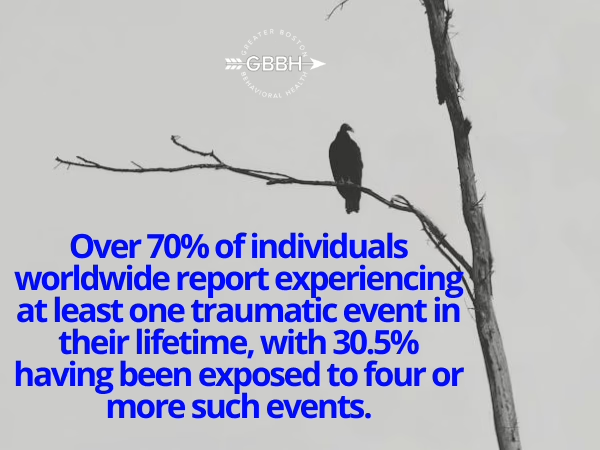Trauma is a deeply distressing experience that can have long-lasting effects on mental, emotional, and physical well-being. It can result from various life-altering events, including childhood abuse, domestic violence, military combat, serious accidents, the sudden loss of a loved one, or exposure to ongoing stressors. For many individuals, the effects of trauma extend far beyond the initial event, leading to conditions such as post-traumatic stress disorder (PTSD), anxiety disorders, depression, and substance use disorders.
Recovering from trauma is not a linear process, and for many, healing requires a structured, supportive, and professional environment that offers intensive care. Inpatient treatment programs provide a safe space for individuals to process trauma, develop coping skills, and regain control over their emotional and psychological well-being.
At Greater Boston Behavioral Health, we specialize in trauma-focused inpatient care, offering evidence-based therapies, psychiatric support, and individualized treatment plans to help individuals navigate the path to healing. This guide explores how inpatient treatment supports trauma recovery, what to expect in a trauma-focused program, and how structured care leads to long-term healing.
The Need for Inpatient Treatment in Trauma Recovery
Trauma can significantly alter how individuals think, feel, and behave. Many people who have experienced trauma may struggle with symptoms such as flashbacks, nightmares, panic attacks, emotional numbness, hypervigilance, and difficulties in relationships. Without proper intervention, trauma symptoms can become overwhelming and disruptive to daily life, making professional support necessary.
Who Benefits from Inpatient Trauma Treatment?
Inpatient trauma treatment is recommended for individuals who:
- Struggle with severe PTSD, anxiety, or depression.
- Experience flashbacks, intrusive thoughts, or emotional dysregulation.
- Have suicidal ideation, self-harming behaviors, or thoughts of harming others.
- Engage in substance use as a coping mechanism for trauma-related distress.
- Have difficulty functioning in daily life, work, or relationships.
- Require a structured, supportive environment for healing.
For many, inpatient treatment provides the foundation necessary for long-term emotional and psychological recovery.
The Benefits of an Inpatient Setting for Trauma Recovery
1. A Safe and Supportive Environment for Healing
Trauma often causes individuals to feel unsafe in their own minds and bodies. They may experience heightened anxiety, difficulty trusting others, or an overwhelming sense of fear. In an inpatient setting, individuals are provided with a structured and secure environment where they can focus on their healing journey without external stressors.
Inpatient programs ensure:
- 24/7 supervision and crisis intervention to prevent self-harm or suicide.
- A highly structured routine that reduces anxiety and promotes emotional stability.
- A supportive and non-judgmental atmosphere where individuals can process emotions safely.
This structured setting allows individuals to address their trauma in a controlled, therapeutic manner, reducing the likelihood of re-traumatization.
2. Comprehensive Trauma-Focused Therapy
Therapeutic intervention is at the core of inpatient trauma treatment. Unlike outpatient therapy, where sessions occur weekly or biweekly, inpatient programs provide intensive daily therapy designed to promote deep healing.
Evidence-Based Therapies Used in Inpatient Trauma Treatment
- Cognitive Behavioral Therapy (CBT Therapy): Helps individuals challenge and replace negative thought patterns related to trauma. It is especially effective in reducing the severity of PTSD symptoms, including flashbacks and intrusive thoughts.
- Dialectical Behavior Therapy (DBT Therapy): Focuses on emotional regulation, distress tolerance, and mindfulness. It is highly effective for individuals who struggle with intense emotions or self-destructive behaviors.
- Exposure Therapy: Gradually helps individuals confront trauma-related fears in a controlled setting, reducing avoidance behaviors and anxiety.
- Group Therapy Programs: Allow individuals to connect with others who have experienced similar trauma, providing validation, support, and encouragement.
- Family Therapy Programs: Help family members understand trauma and learn how to support their loved one’s healing journey.
These therapies help individuals develop healthier ways to process emotions and build resilience against future stressors.
3. Medication Management and Psychiatric Support
For individuals experiencing severe trauma-related symptoms, medication can play a crucial role in stabilizing mood, reducing anxiety, and improving sleep. However, psychiatric medications require careful monitoring to ensure effectiveness.
Commonly prescribed medications include:
- Selective serotonin reuptake inhibitors (SSRIs) and serotonin-norepinephrine reuptake inhibitors (SNRIs) to help regulate mood and anxiety.
- Beta-blockers to manage panic attacks and physiological responses to trauma.
- Mood stabilizers or antipsychotics for individuals experiencing severe emotional dysregulation or dissociation.
In an inpatient setting, psychiatric professionals work closely with individuals to monitor progress, adjust medication as needed, and integrate medication management with therapeutic interventions.
4. Developing Healthy Coping Mechanisms
Trauma often leads to unhealthy coping mechanisms, such as avoidance, substance use, self-isolation, or emotional suppression. In an inpatient setting, individuals learn alternative coping strategies that promote long-term healing.
Healthy coping strategies include:
- Grounding techniques to stay present during distressing moments.
- Breathing exercises and mindfulness practices to reduce anxiety.
- Journaling and expressive therapies to process emotions in a safe way.
- Building self-compassion and self-care routines to foster emotional well-being.
By the time individuals transition to outpatient treatment, they have stronger tools for managing their emotions and reducing trauma-related distress.
5. Rebuilding Relationships and Establishing Boundaries
Many individuals with trauma struggle with trust issues, emotional detachment, or unhealthy relationship patterns. An inpatient program provides:
- Interpersonal skills training to help individuals navigate relationships more effectively.
- Family therapy sessions to rebuild trust and communication.
- Support groups to foster peer connections and reduce isolation.
By strengthening relationships and learning how to set boundaries, individuals gain confidence in their ability to maintain healthy interactions post-treatment.
What to Expect in an Inpatient Trauma Treatment Program
Daily Structure and Therapeutic Activities
A typical day in an inpatient trauma recovery program includes:
- Morning meditation or grounding exercises to start the day with focus.
- Individual therapy sessions with trauma specialists.
- Group therapy sessions for peer support and shared healing.
- Educational workshops on emotional regulation and coping techniques.
- Holistic activities such as art therapy, music therapy, and yoga to promote relaxation.
A structured routine helps individuals build consistency, develop healthy habits, and create a stable foundation for healing.
Transitioning from Inpatient to Outpatient Care
Trauma recovery does not end when inpatient treatment is completed. A step-down approach ensures continued support and long-term success.
After inpatient care, individuals often transition to:
- Partial Hospitalization Program (PHP): Intensive therapy sessions during the day, returning home at night.
- Intensive Outpatient Program (IOP): A structured program with flexible scheduling, allowing for continued treatment while reintegrating into daily life.
- Outpatient Therapy and Support Groups: Long-term counseling and peer support to maintain progress.
At Greater Boston Behavioral Health, we develop personalized aftercare plans to help individuals navigate post-treatment challenges.
Start Your Trauma Recovery Journey at Greater Boston Behavioral Health
Healing from trauma requires expert guidance, structured care, and a supportive environment. At Greater Boston Behavioral Health, we provide comprehensive inpatient trauma treatment programs that help individuals regain emotional stability, develop coping skills, and build a foundation for long-term recovery.
Take the Next Step Toward Healing
If you or a loved one is struggling with trauma-related distress, we are here to help. Call Greater Boston Behavioral Health at (888)278-0716 to learn more about our Inpatient Trauma Therapy Program and Mental Health Treatment Services in Boston. You don’t have to face trauma alone—professional support can help you reclaim your life.
FAQ on Trauma Recovery in an Inpatient Setting
What is inpatient trauma treatment?
Inpatient trauma treatment is an intensive, 24/7 care program designed for individuals struggling with PTSD, anxiety, depression, and emotional dysregulation due to past trauma. It provides a safe, structured environment with professional support to help individuals heal and regain control over their lives.
Who should consider inpatient trauma treatment?
Inpatient trauma care is ideal for individuals who:
- Experience severe PTSD, flashbacks, or panic attacks.
- Struggle with suicidal thoughts or self-harming behaviors.
- Have co-occurring disorders, such as substance use or depression.
- Find it difficult to function in daily life, work, or relationships.
- Have not found success in outpatient therapy and need intensive care.
What types of therapy are used in inpatient trauma treatment?
Inpatient trauma recovery programs use evidence-based therapies, including:
- Cognitive Behavioral Therapy (CBT Therapy) to help reframe negative thought patterns.
- Dialectical Behavior Therapy (DBT Therapy) for emotional regulation and distress tolerance.
- Exposure Therapy to help individuals gradually confront trauma-related fears.
- Group Therapy Programs for shared support and connection with others.
- Family Therapy Programs to strengthen relationships and communication.
How does inpatient treatment create a safe space for trauma recovery?
Inpatient programs provide:
- 24/7 medical supervision to ensure emotional and physical safety.
- A structured daily routine to reduce anxiety and unpredictability.
- A supportive, judgment-free environment for processing emotions.
What happens after inpatient trauma treatment?
After inpatient care, individuals typically transition into structured outpatient programs for continued recovery. Options include:
- Partial Hospitalization Program (PHP) – Provides intensive therapy while allowing individuals to return home at night.
- Intensive Outpatient Program (IOP) – Offers flexible treatment while reintegrating into daily responsibilities.
- Ongoing outpatient therapy and support groups for long-term healing.
How do I get started with inpatient trauma treatment at Greater Boston Behavioral Health?
Call Greater Boston Behavioral Health at (888)278-0716 to speak with a mental health professional and explore our Inpatient Trauma Therapy Program in Boston.


